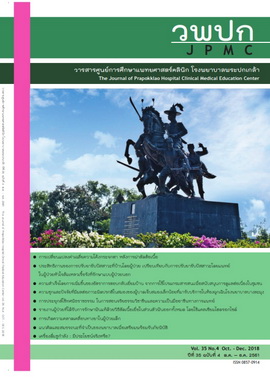Which virtues of the king applicable to teach medical ethics and professionalism?
Main Article Content
Abstract
Background: Teaching medical professionalism is a challenging task as in how, what, and when to teach. By being professional, one should possess certain characteristics, attitudes, competencies, and conduct of their respective profession. Professionalism involves multi –faceted concepts and different issues with social purposes, thus necessitating a need for careful selection of learning topics and practical instructional designs according to Thai social situations.
Objective: The objective of this research is to study medical students on their perception of Royal Virtues “Ten Duties of the King" (dasa-raja-dhamma), and the application of those virtues to the medical profession.
Materials and Methods: This study is a qualitative research effort using focus group interviews during October, 2016 and November, 2016. 28 medical students who attended an extra-curriculum integration course participated. Data from group interviews were primarily analyzed using content analysis and descriptive statistics.
Results: The medical students perceptions related to Royal Virtue could be categorized into four issues: 1.Benefits to future medical profession 2. Help to become good doctors 3. Lessen conflicts with patients or colleagues 4. The virtues could be cultivated. The most common virtues that medical students thought applicable to their future professions were Khanti (60.7%), Sila (50.0%) and Tapa (50.0%). The least common virtues were Akkodha (7.1%) and Avihimsa (7.1%).
Conclusion: The results of this study can be used as a guideline in designing instructional methods to teach medical ethics and professionalism that are consistent with Thai social context learning through positive role models.
Article Details
References
1. Suthumniran A. Ten tips of teaching professionalism. In: Boonluksiri P, editor. Professional medical educators. Khonkaen: Khonkaen publishing, 2018.
2. Shayakul C. Medical professionalism. In: Shayakul C, Veerakul G, Pradithsuwan R, Thongtang V, editors. Medical ethics. Bangkok: Duentula publishing house. 2012.
3. Education department, Faculty of medicine Siriraj hospital, Mahidol University. Qualifications for higher education in doctor of medicine (M.D.) Program [Internet]. 2012 [cited 2016 Oct 28]. Available from: https://www.educationsi.sicsc.net/attachments/article/257/02_090320161734.pdf
4. Sumalrot T, Supparerkchaisakul N, Ngamthipwatthana T. Medical professionalism: Development and Validation of medical professionalism scale (MPS). JBSD. 2018;10 :126- 45.
5. Wright S, Wong A, Newill C. The impact of role models on medical students. JGIM; [Internet]. 1997, [cited 2016 Oct 28]. Available from: https://depts.washington.edu/fammed/files/Role%20Model%20Impact.pdf
6. Kittinon K, Chamnanvanakij S, Pimparyon P, Saengaroon P, Perceptions of medical students on Medical Ethics teaching at Phramongkutklo College of Medicine. RTA Med J 2015;68:79-85.
7. Cruess SR, Cruess RL, Steinert Y. Role modeling making the most of a powerful teaching strategy. BMJ 2008; 336:718 -21.
8. Phrabrahmagunabhorn (P. A. Payutto). A constitution for livings Buddhist principles for a fruitful and harmonious life. Bangkok : National office of buddhism. 2007.
9. Sawasdichai K. How we teach medical ethic?. J PrapokklaoHospClin Med Educat Center 2003;20: 110- 2.
10. Roberts LW, Green Hammond KA, Geppert CM, Warner TD. The positive role of professionalism and ethics training in medical education: a comparison of medical student and resident perspectives. Acad Psychiatry 2004; 28:170-82.
11. Wright SM, Kern DE, Kolondner K, et al. Attributes of excellent attending - physician role models. New Eng J Med 1996;339:1986-93.
12. Pongprasobchai P. Teaching attitude and professionalism. In: Iramaneerat C, Pongprasobchai P, Praditsuwan R, editors. Trick for medical educator. Bangkok: Krungtepvejchasal Publishing, 2013. P.135-143.
13. The medical council of thailand. Thai medical student's code of conduct. [Internet]. 2013 [Cited 2013 Jul 19]. Available from: https://www.tmc.or.th/detail_news.php?news_id=721
14. Chandeying V, Chandeying N. Medical professionalism: teaching and learning methods, role and assessment. Songkla Med J 2013;31:155-66.
15. Phaosavasdi S, Taneepanichskull S, Tannirandorn, Thamkhantho M, Pruksapong C, Kanjanapitak A. Medical ethics for senior medical doctors (episode II). J Med Assoc Thai 2005; 88:867-8.

